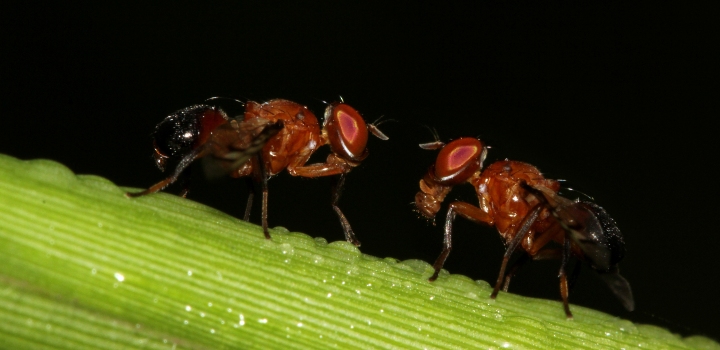How eating less in early life could help with reproduction later on
By: News Archive

Switching from a restricted diet to eating as much as you like could be beneficial for reproduction in later life, according to new research from the University of East Anglia.
Researchers studied the eating and mating habits of the small fruit fly Drosophila melanogaster.
They found that females that consumed less food for their entire lives lived longer, however they didn’t reproduce as well as their better-fed counterparts.
But those that switched from a restricted diet to unlimited food, started mating and reproducing more. These flies produced three times more offspring than those that were kept on a restricted diet.
Meanwhile their survival was similar to females that had been fully-fed their whole lives.
Lead researcher Dr Zahida Sultanova, from UEA’s School of Biological Sciences, said: “Dietary restriction is associated with longer life and better health in many organisms, including humans.
“We wanted to find out what happens when dietary restriction in early in life is followed by eating a lot later in life.”
The team investigated the effect of early life dietary restriction on survival, mating behaviour and reproduction in fruit flies.
While some were given enough food, others were put on a restricted diet with just 40 per cent of their usual intake of yeast.
A third group were put on a restricted diet in early life, followed by being allowed to consume as much as they liked.
Dr Sultanova said: “Dietary restriction is generally associated with better health and reduced reproduction.
“However, when our flies were switched from a restricted diet to normal eating, they started mating and reproducing more, while their survival became similar to fully-fed females.
“These results in fruit flies show that females reproduce little while they are eating little but they maintain their reproductive health and when they have unlimited food late in life, they immediately start reproducing a lot.
“This shows that reduced reproduction due to eating less in early life can be fully compensated by switching to a rich diet late in life.
“There have been very few studies on dietary restriction and reproductive health in humans – mainly because these sorts of studies have ethical and logistical limitations.
“However, the results from studies in model organisms suggest that it is worth exploring this further using approaches that are more suitable to humans.”
The study was funded by the Biotechnology and Biological Sciences Research Council (BBSRC) the European Research Council (ERC) and the Natural Environment Research Council (NERC).
‘Fitness benefits of dietary restriction’ is published in the journal Proceedings of the Royal Society B on Wednesday, November 24, 2021.
Related Articles

Michael Grange appointed as new Royal Society Entrepreneur in Residence
Michael Grange has been appointed as the new Royal Society Entrepreneur in Residence for the Faculty of Science, following in the footsteps of Dr Soraya Jones who previously held the role.
Read more
Ultra low frequency gravitational waves detected in space
Researchers at the University of East Anglia are part of an international team that have found evidence for ultra-low-frequency gravitational waves in space.
Read more
Study of Earth's stratosphere reduces uncertainty in future climate change
New research led by the University of East Anglia (UEA) reduces uncertainty in future climate change linked to the stratosphere, with important implications for life on Earth.
Read more